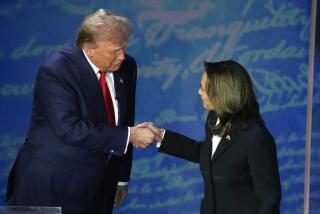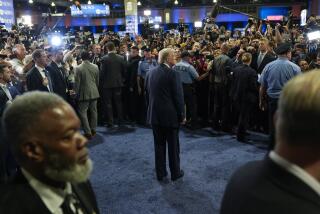Clinton’s rivals see an opening
WASHINGTON — After searching for ways to rattle Sen. Hillary Rodham Clinton and stem her momentum in the Democratic presidential race, her chief rivals believe they have found an opening: what they cast as her evasiveness on several key issues.
The campaigns of Sen. Barack Obama of Illinois and former Sen. John Edwards of North Carolina wasted little time Wednesday suggesting that the New York senator’s performance in Tuesday’s debate unmasked her as a candidate unwilling to commit to concrete plans.
On at least five issues raised in the debate, Clinton replied in ways that left it unclear what she meant or what action she might take.
That practice has worked for her in the past, permitting her to avoid positions that might antagonize voters, particularly the less partisan ones important to victory in the general election.
But the limitations and potential perils of her approach were driven home at the debate in Philadelphia.
In comments likely foreshadowing the shape of the Democratic contest in coming weeks, top Obama strategist David Axelrod said: “We’re going to spell out positions on issues and demand others do as well. One of the things that people are looking for is someone . . . who will be forthright with them and not pass everything through a political calculator. It’s a distinction in this race.”
A memo issued by the Edwards campaign was more blunt, charging that Clinton was not “telling the truth to the American people.”
Republican presidential contender Rudolph W. Giuliani eagerly joined in Wednesday, taking a swipe at Clinton that echoed complaints from her Democratic rivals.
“She was being attacked all night for taking different positions in front of different audiences,” Giuliani said in a radio interview. “And then, by the end of the night, she took different positions in front of the same audience. It was pretty amazing. I mean, in politics I’ve never quite seen that before.”
The response from the Clinton campaign included a somewhat lighthearted touch -- it posted a video on YouTube with footage of her debate rivals repeatedly invoking her name, set to Mozart’s “The Marriage of Figaro.”
The montage ends with a clip of Clinton saying during the debate: “I seem to be the topic of great conversation and great consternation. . . .”
The issues on which her rivals were taking her to task included Social Security, whose long-term viability is a source of worry for many Americans.
In the debate, she talked about setting up a bipartisan commission to study the system, while pushing the government toward the broad goal of “fiscal responsibility.” But she skirted any specifics frequently discussed among Democrats to shore up the system, such as raising taxes, limiting benefits or lifting the age at which people could draw benefits.
The topic that caused her biggest political headache was the proposal by New York Gov. Eliot Spitzer to give driver’s licenses to illegal immigrants.
Asked her stance on it, she first commended Spitzer for attempting to grapple with a problem that persists because of the federal government’s failure to enact a “comprehensive” revamping of immigration law.
She later hastened to add she wasn’t necessarily endorsing Spitzer’s plan.
To that, Sen. Christopher J. Dodd of Connecticut said: “No, no, no. You said yes, you thought it made sense to do it.”
“No, I didn’t, Chris,” Clinton said, prompting Edwards to accuse her of double-talk.
Earlier in the debate, Clinton was asked about the controversial plan by Rep. Charles B. Rangel (D-N.Y.) to overhaul the tax code. Rangel, a Clinton supporter, has suggested repealing the Alternative Minimum Tax, a burden to some middle-class families, and imposing a 4% surtax on wealthier households.
In the course of her answer, Clinton praised Rangel’s “goal,” said she did not have all the specifics of the plan and added that she did not like some of the details.
On another subject, Clinton would not commit to urging the National Archives to release about 2 million pages of records from her days as first lady, now locked in her husband’s presidential library in Little Rock, Ark.
On Iraq, she said she was for ending the war, but also said an unspecified number of troops may be left in place for an ongoing mission of battling Al Qaeda fighters in that country.
With the voting in the Democratic contest scheduled to begin in two months in Iowa, Clinton’s rivals have little alternative but to make her a focus of criticism, analysts said. Though polls show a tight race in Iowa, Clinton’s support in national surveys is double that of Obama, who runs second.
“They have no choice but to go after her vulnerabilities,” said Susan MacManus, a political science professor at the University of South Florida in Tampa.
Clinton sympathizers acknowledged that the debate was a tough one for her, though they expressed hope the fallout would be mild.
Pennsylvania Gov. Edward G. Rendell, a Democrat who was a strong supporter of former President Clinton, said shortly after the debate: “Early on, Hillary Clinton was attacked but did a good job defending herself. In the last half-hour she probably didn’t do so well. But, gosh, if there was anyone watching in the last half hour, I’d be surprised.”
A spokesperson for the Nielsen Co. reported that the debate, televised on MSNBC, attracted 2.5 million viewers and posted a rating of 0.9%. By contrast, a forum featuring the Democrats in September on the same cable network had an audience of fewer than 1.5 million viewers, with a 0.5% rating.
The most recent Republican presidential debate, Oct. 21 on Fox News Channel, was viewed by almost 2.4 million people; its rating was 0.8%.
Times researcher Nona Yates in Los Angeles contributed to this report.
More to Read
Sign up for Essential California
The most important California stories and recommendations in your inbox every morning.
You may occasionally receive promotional content from the Los Angeles Times.











